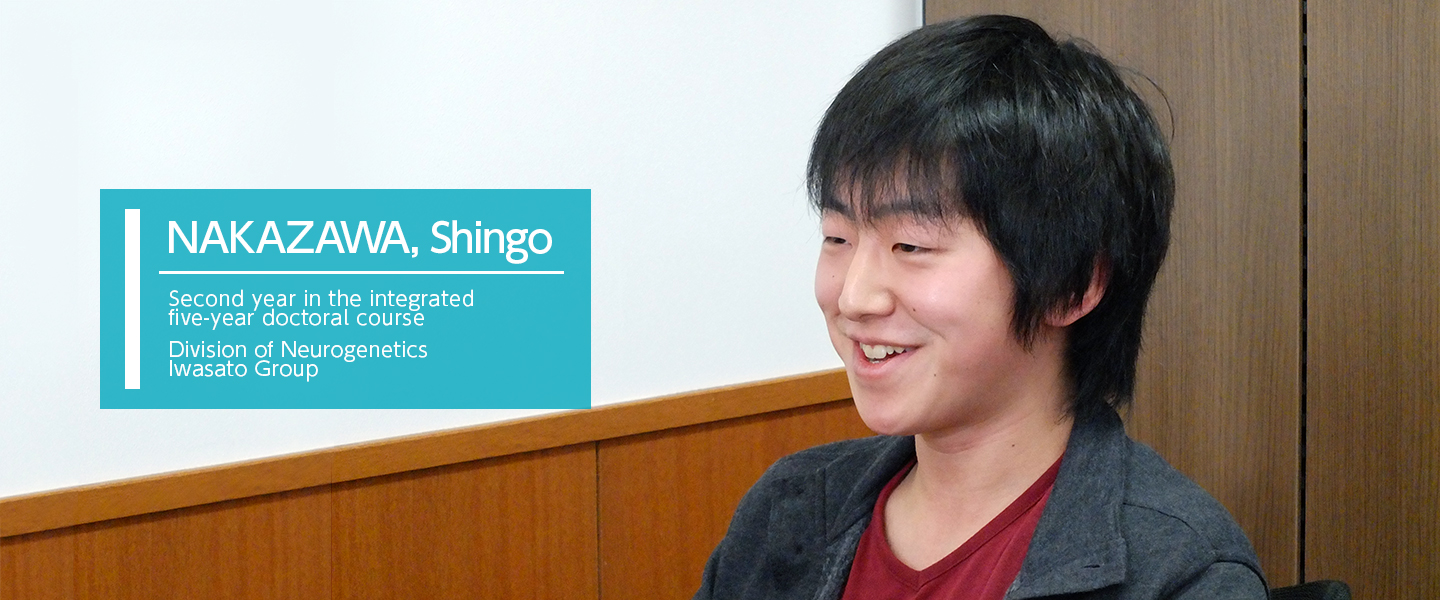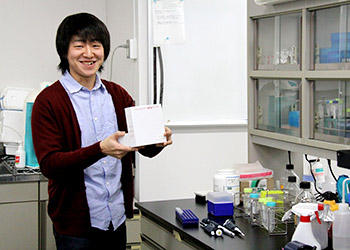Division of Neurogenetics, Iwasato Group NAKAZAWA, Shingo

- Please tell us about your research.
- I’m interested in the development of neural circuits in the brain. The brain receives a burst of information as soon as the baby is born and gets exposed to the external environment, such as light and sound. Along with this input neural circuits of the brain are rapidly formed. What happens at that moment? What mechanisms exist? To find out the answers to these questions I am studying the mouse somatosensory system as a model.
- Why did you choose NIG?
- I became interested in the nervous system when I heard about neurodegenerative disorder in a lecture in my undergraduate sophomore year. I then read a variety of books on brain science and became eager to study how the neural circuit formation is controlled in the brain. I also joined briefing seminars and lab tours at several graduate schools and heard stories from senior graduate students.
I learned about NIG through the mentor of my undergraduate thesis; I explained what kind of research I wanted to do, and he introduced Prof. Iwasato to me. After contacting Prof. Iwasato by e-mail and visiting his lab, I found that the research conducted at the lab was just what I wanted to do. That’s why I decided to study with him; that was between the end of May and the beginning of June.
- How did your entrance exam go?
- Although I was broadly studying for entrance exams for graduate schools, I was not sure what to study for the unique entrance exam of NIG; its exam asks your way of thinking rather than your knowledge. I actually liked that kind of exam; the 3-hour written exam was over before I realized it. But at the interview performed next day, I was very nervous and afterwards regretted “Why wasn’t I able to answer that question?” They asked a lot about my senior thesis project.
- How is your research life?
 I have little time for myself now. As I use mice for my research, I often plan experiments even on Sundays. I spend most of my time doing experiment in the lab or sleeping at home.
I have little time for myself now. As I use mice for my research, I often plan experiments even on Sundays. I spend most of my time doing experiment in the lab or sleeping at home.
I am very well taken care of in my lab. If I want to use research funds for my research and explain what I want to do, my wish is granted most of the time. If I want to know something and ask questions after thinking about it myself, my lab members definitely respond to my question. Of course Prof. Iwasato makes time to discuss with students. For those who can think by themselves and move into action, NIG is a much better place than other graduate schools; it offers unparalleled support to such independent students. For those who cannot do anything without instructions, it might be a tough place to survive.- What would be your advice to future graduate students at NIG?
- Choose a lab based on the atmosphere of the lab rather than the particular research project you wish to pursue. If you don’t feel comfortable in the atmosphere, it is tough to spend much time in the lab.
- How is your life in Mishima?
- I love Mishima! Many people say that Mishima is a rural area, but it’s a “big city” compared to my hometown. When I went to a university in the metropolitan area, I used to get stressed by the rush-hour train; but there is no such stress in Mishima. Moreover, Mishima has a lot of nice independent restaurants, and I often wander around the Mishima-Hirokoji Station around which many restaurants gather. I especially love the local beer in Numazu (the city next to Mishima). If you love beer it’s worth coming here for beer alone! For lunch, I usually go to the NIG cafeteria. They consider our health and plan the menu especially for us.
- What would you like to do in the future?
- To become a researcher, I should develop the ability to convey my research not only to researchers but also to non-researchers across the world; just staying in the lab and doing experiments is not enough. I am dreaming about becoming a scientist who can act as a bridge between the researcher and the world, such as a science communicator.
Back

 I have little time for myself now. As I use mice for my research, I often plan experiments even on Sundays. I spend most of my time doing experiment in the lab or sleeping at home.
I have little time for myself now. As I use mice for my research, I often plan experiments even on Sundays. I spend most of my time doing experiment in the lab or sleeping at home.














